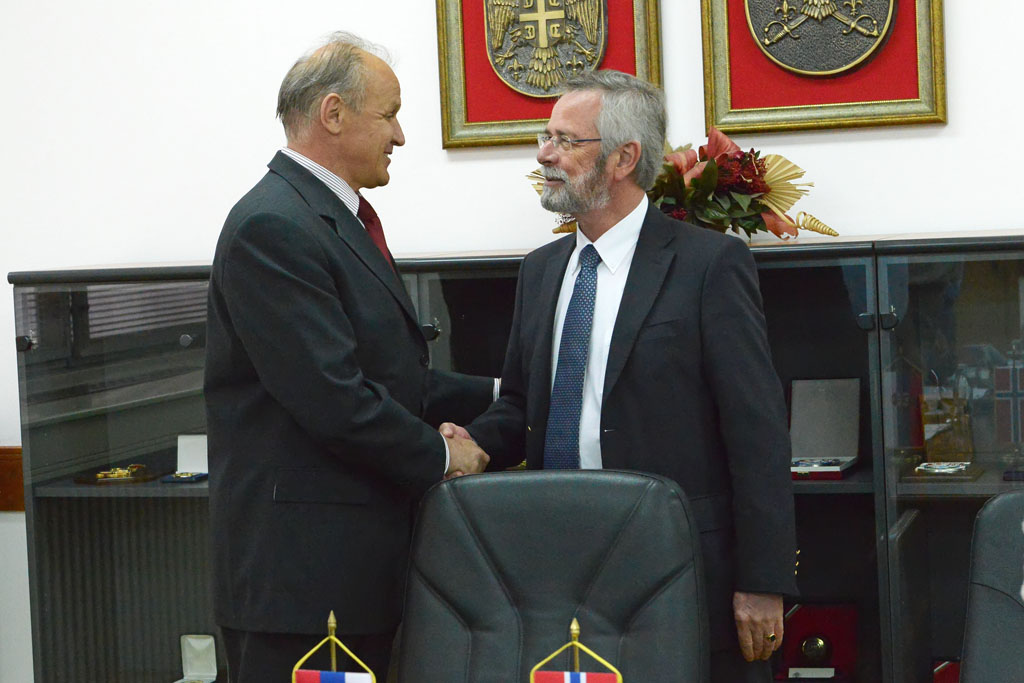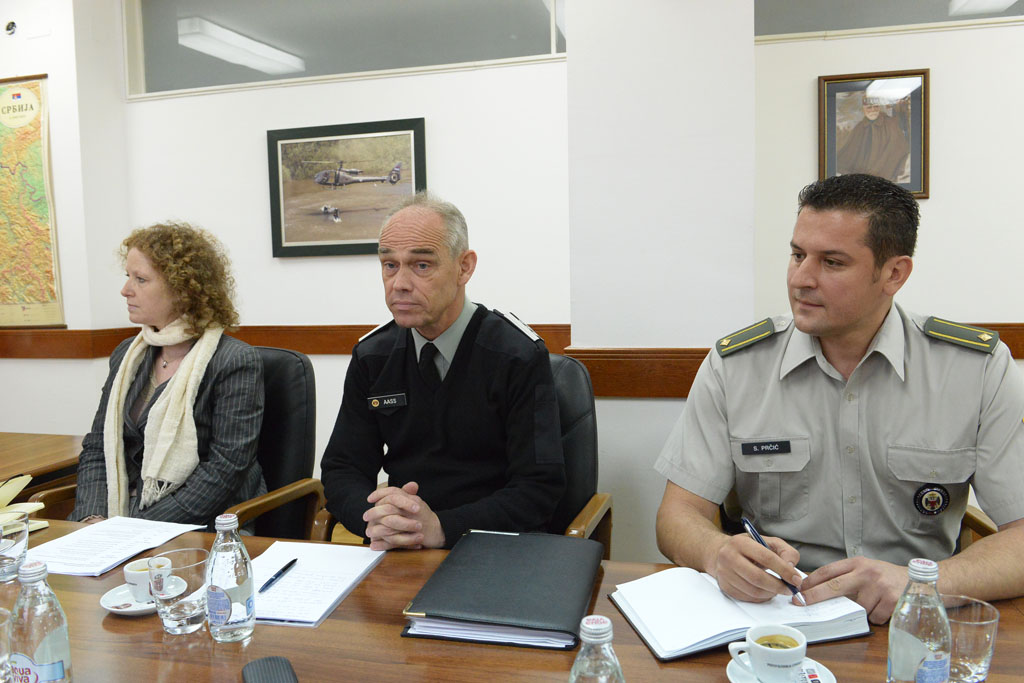- About MoD
Minister and Associates
- Minister
- State Secretary
- Assistant Ministers
- Secretary of the Ministry of Defence
Sectors
- Defence Policy Sector
- Human Resources Sector
- Material Resources Sector
- Budget and Finanance Sector
- Sector for Infrastructure and Hospitality Services
- SAF
- Documents
- Services
- Sport
- Archive
- Contacts
13.05.2013.
Assistant Minister Jovanovic Received the Norwegian Delegation
The delegation
 of the Ministry of Foreign Affairs of the Kingdom of Norway, led by Ambassador Steffen Kongstad, was received by the Assistant Minister for Defence Policy Miroslav Jovanovic who pointed out on that occasion the continuity of the successful cooperation between the Ministry of Defence of the Republic of Serbia and the Ministry of Defence of the Kkingdom of Norway.
of the Ministry of Foreign Affairs of the Kingdom of Norway, led by Ambassador Steffen Kongstad, was received by the Assistant Minister for Defence Policy Miroslav Jovanovic who pointed out on that occasion the continuity of the successful cooperation between the Ministry of Defence of the Republic of Serbia and the Ministry of Defence of the Kkingdom of Norway.Ambassador Kongstad, Permanent Representative of Norway to the United Nations and President of the Third Meeting of States Parties to the Convention on Cluster Munitions briefed the Assistant Minister about the activities that are undertaken to implement the Convention on Cluster Munitions and also invited the Republic of Serbia to accede to the Convention. He particularly expressed his satisfaction with the efforts undertaken by the Republic of Serbia in the field of disarmament, as well as with the realized and the future cooperation between the Ministry of Defence and the NGO Norwegian People's Aid (NPA) in the destruction of cluster munitions declared surplus by the Serbian Armed Forces.
Assistant Minister Jovanovic pointed out that the high quality cooperation between the Republic of Serbia and international organizations in the field of disarmament and arms control, particularly with the UN and the OSCE, is of great importance for the continuation of the reform process to which the Minis of Deftry of Defence is truly committed, which is particularly important for the progress of our country towards the full EU membership. The Ministry of Defence is actively engaged in meeting the international obligations in accordance with the provisions of conventions, treaties and programmes in the field of disarmament, which the Republic of Serbia is a party to, such as the Ottawa Convention, CCW, CWC, BTWC, ATT, SALW, etc.
Within the long term modernization plans, the Ministry of Defence and the Serbian Armed Forces plan to purchase more modern weapons and military equipment, which would be a replacement for cluster munitions. Due to the negative impact of the financial crisis, this process is much slower.
The tragi
 c events with lethal consequences that have occurred in the past during the removal of explosive remnants of war from a part of the territory of the Republic of Serbia are used as the argument why the Republic of Serbia should accede to the Convention on Cluster Munitions. This actually ignores the fact that the tragic victims are not caused by cluster munitions in the arms of the Serbian Armed Forces, but they are the consequence of the use of cluster bombs by NATO countries during the 1999 bombing against military and civilian targets in the territory of the Republic of Serbia.
c events with lethal consequences that have occurred in the past during the removal of explosive remnants of war from a part of the territory of the Republic of Serbia are used as the argument why the Republic of Serbia should accede to the Convention on Cluster Munitions. This actually ignores the fact that the tragic victims are not caused by cluster munitions in the arms of the Serbian Armed Forces, but they are the consequence of the use of cluster bombs by NATO countries during the 1999 bombing against military and civilian targets in the territory of the Republic of Serbia.Having in mind the prohibition of the use, time resources of cluster munitions at disposal and the limited capacity of the defence industry and TRZ Kragujevac when it comes to repair and improving the performance, the Ministry of Defence takes measures and activities that a part of the cluster munitions be withdrawn from the operational use and in collaboration with the Norwegian People's Aid start with its disassembly and destruction.
The previous collaboration with international organizations in the destruction of surplus ammunition and ordnance, such as the OSCE, the United Nations (UN Development Programme – UNDP), the EU and the NATO initiative to establish a new Trust Fund for the Republic of Serbia, the Ministry of Defence assesses as very successful and is committed to its further promotion.
- About MoD
- Jurisdiction
- Organisation scheme
- Description of duties
- Minister and Associates
- Minister
- State Secretary
- Assistant Ministers
- Secretary of the Ministry of Defence
- Sectors
- Defence Policy Sector
- Human Resources Sector
- Material Resources Sector
- Budget and Finanance Sector
- Sector for Infrastructure and Hospitality Services
- Special Internal Units
- Secretariat
- Office of the Minister of Defence
- Military Attorney's Office
- Administrative Bodies within MoD
- Defence Inspectorate
- Military Intelligence Agency
- Military Security Agency
- Autonomous Departments
- Public Relations Department
- Military Healthcare Department
- Higher Education Institution
- Defence University
- Specific internal units
- Inspector General of the Services
- Internal Audit Section
- SAF
- Documents
- Services
- Sport
- Archive
- Contacts

